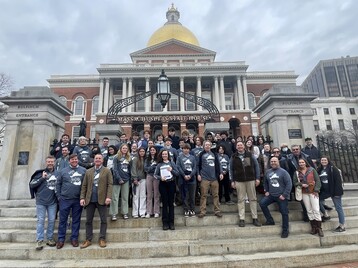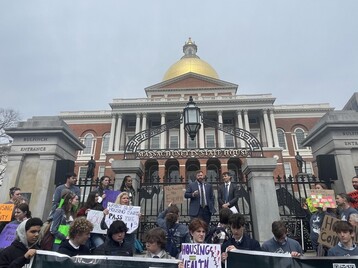Rallying At State House, Islanders Renew Push For Housing Bank Tax
Jason Graziadei •

Rallying on the steps of the Statehouse in Boston on Thursday, nearly 60 Nantucket residents urged state lawmakers to finally pass the so-called Housing Bank legislation to fund affordable housing initiatives on the island. And they were not alone.
The Nantucket group - which included Cyrus Peirce Middle School students, Select Board members, Land Bank commissioners, realtors, and the Chamber of Commerce - was joined by an even larger contingent from Martha’s Vineyard that was seeking the same thing: a transfer tax on large home sales that could help alleviate the housing crisis playing out on both islands.
Together, they spent the day walking the halls of the State House to plead their case to state lawmakers and their staff, then gathered on Beacon Street below the famed golden dome of the iconic Boston building for the rally.
“I keep seeing this become a more drastic situation, and I wanted to have my voice heard,” said Raul Romero, a TSA agent at Nantucket Memorial Airport and veteran of the island restaurant industry. “At one time I almost became homeless, and I’m seeing certain people I know living in situations that are uninhabitable, almost. I’m at the point where I won’t be able to sustain living on the island.”
Nantucket’s quest for the housing bank legislation has been ongoing for more than a decade, and the concept has caught on with other communities - on the Vineyard, on Cape Cod and beyond - that have joined the fight. The island is seeking what Nantucket’s municipal housing director Tucker Holland calls a modest request: a .5 percent transfer tax on real estate sales above $2 million to fund affordable housing initiatives. Had it been in place last year, it would have generated more than $6 million.

On the steps of the State House, Holland took the microphone and outlined the stark realities of Nantucket’s housing crisis. There are currently only 65 residential real estate listings on the island, Holland said, and the average prices is $6.2 million. In 2022, the average home sale price was $4 million, and the median price was $3 million.
“You’d have to be earning $591,000 a year in today’s interest rate environment to afford the median home on Nantucket,” Holland said. “That just doesn’t work.”
While the state legislators who represent the Cape and Islands region - Sen. Julian Cyr and Rep. Dylan Fernandes - both vowed to get a local option transfer fee enacted, standing in the way once again is the powerful Massachusetts Association of Realtors. The trade group has been influential in blocking the legislation in the past, but both Holland and Housing Nantucket executive director Anne Kuszpa said this would be the year the Housing Bank bill finally passes.
“Mass Realtors and their lobby remain the main obstacle though many of their Cape and Islands brethren are vocal backers of a local option transfer fee,” Holland told the Current. “They live here. They get it. It is overcome with education. And that effort took a big step forward today with hundreds showing up from both Nantucket and Martha’s Vineyard.”

Joining Holland as one of the featured speakers during the rally was Nantucket Island Chamber of Commerce executive director Pete Burke, who called on state lawmakers to pass a local option transfer fee that would allow municipalities to adopt a housing bank tax to suit their needs.
“The number one challenge facing our Chamber members is housing,” Burke said. “Attracting and retaining talent is a rapidly accelerating problem with the number one impediment being lack of access to affordable housing options. We are experiencing this at every level of employment; from hourly, seasonal, part-time positions, to full-time , year-round salaries positions.”
But perhaps the most emphatic and moving remarks spoken at Thursday’s rally came from the youngest speaker: Martha’s Vineyard Public Charter School senior Greyson Kirk.
“I’m here to represent the unseen, unheard working class of the islands,” Kirk said. “We are the very backbone of the island community and yet our means of survival are dwindling. Our community is denied the resources it needs, and is pushed into overpriced rentals that are often falling apart while mansions sit empty for nine months out of the year. It’s almost a mockery of our community.
“What happens when we all get pushed off?,” she asked. “Who will work the restaurants? Who will work the boats to bring people over here? Who will keep the beaches clean, the stores open? And the seasonal houses kept? And that’s not to say that this is all we’re here for. We’re not just servants of the wealthy. We are what makes the islands resilient and beautiful. Get rid of the community, and you don’t have an island. This is our home and we deserve to live here."

With their constituents looking on, both Cyr and Fernandes both gave impassioned speeches about the depth of the housing crisis on islands and Cape Cod, while also vowing to “deliver” the housing bank legislation.
While last year the bill had made new inroads and there was some talk that it may have the momentum to finally pass muster at the State House, Cyr ended up withdrawing the legislation from consideration in July 2022 as it was headed toward defeat.
This year, Cyr said, will be different.
“Our community is truly at a crossroads,” Cyr said. “What we’re doing today is reflective of the moment. That we need this level of action here, that we hear you on Beacon Hill loud and clear. That momentum is building to establish a local option real estate transfer fee to fund housing production and preservation of housing in our communities…We will get a transfer fee - local option - signed into law. We will establish a housing bank. Dylan and I are going to get this done. The momentum is building, and I’m so excited to deliver on this.”
Over the past four years, Nantucket voters have already approved more than $70 million for affordable housing initiatives at town meetings and on the ballot, while the local Community Preservation Committee (CPC) has bonded another $10 million for the cause. Meanwhile, the town has used roughly a quarter ($2 million annually plus bonding authority) of the island's short-term rental tax, which now exceeds $8 million in revenue per year, for housing projects.
Those resources have allowed the town's Affordable Housing Trust to acquire a series of properties - including lots on Orange Street, Bartlett Road, White Street, and Vesper Lane - while accelerating the creation of affordable housing units in the Richmond Great Point subdivision and subsidizing the development to make more of the units affordable to households earning below 120 percent of the area median income (AMI).
"Still, it is not enough," the island's housing advocates wrote in a written pamphlet handed out to state lawmakers during Thursday's visit.


